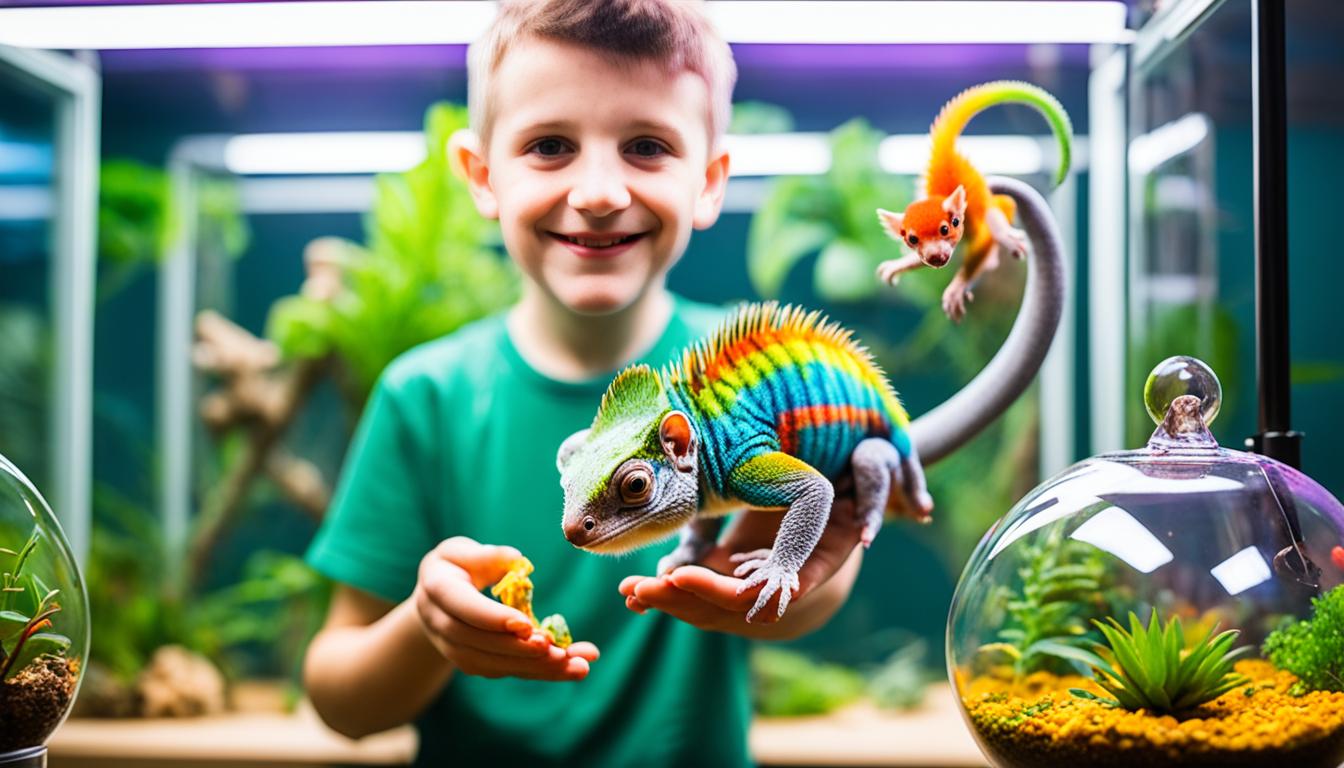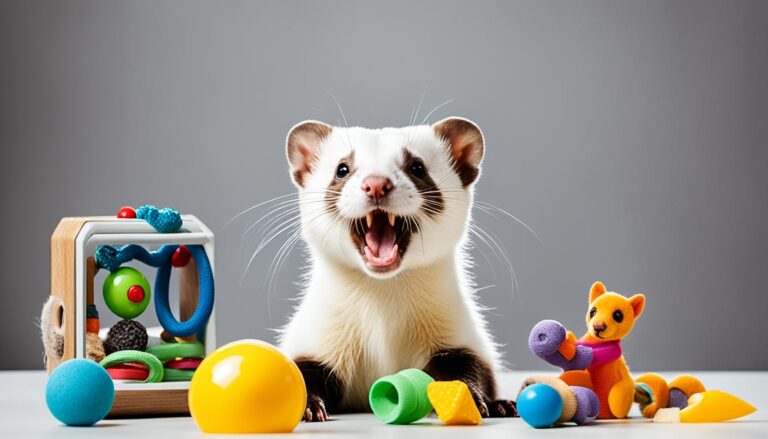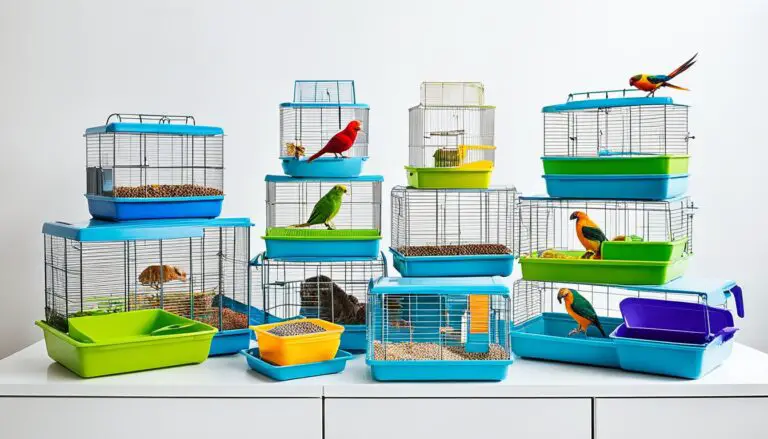Exotic Pet Care Guides for Unique Species
Did you know that wrong care often makes exotic pets sick or even die? It’s key to know what each special animal needs to stay healthy. Each unique pet, from little mammals to reptiles, amphibians, and birds, has its own set of care rules. These rules are different from those for common pets like cats and dogs.
Key Takeaways:
- Proper care is essential for the health and well-being of exotic pets.
- Exotic pets have unique species-specific care requirements.
- Working with a veterinarian experienced with exotic pets is crucial.
- Improper care can lead to illness and death among exotic pets.
- Understanding the needs of your exotic pet is key to providing optimal care.
What is an exotic pet?
An exotic pet is not typical like cats, dogs, or farm animals. They include small mammals, reptiles, amphibians, and birds. Unlike common pets, these creatures have special needs.
Exotic pets are intriguing and need careful care. They vary in size but are usually small. Examples range from the adorable sugar gliders to the interesting ball pythons.
They provide an uncommon bond with their owners. Learning about their care is crucial before getting one. This ensures they are happy and well cared for.
Exotic Pet Handling and Restraint
Handling and caring for an exotic pet requires special attention. You must know the risks of harm and stress these unique animals face. Always aim for safe and gentle handling to keep them healthy and happy.
It’s vital to know how to safely capture or confine your pet. Use gentle methods to lower stress. Tools like special nets or carriers make this safer for your pet and you.
When it comes to lifting and carrying, be cautious to avoid injuries. Each exotic species is different, so the right way to handle them varies. Knowing the best techniques to support their body is key to keep them safe.
Tasks like nail trimming are important but can stress your pet. Use methods that are gentle to make these tasks easier on your pet. A positive experience is crucial for their well-being.
“Proper handling and restraint techniques are essential to ensure the well-being of exotic pets. By learning safe and low-stress handling methods, you can reduce the risk of injury and stress reactions, allowing your pet to thrive in your care.” – Dr. Jane Anderson, Exotic Pet Specialist
Nail Trimming Techniques for Exotic Pets
Keeping your exotic pet’s nails trimmed is crucial. Here are simple tips to do it safely:
- Gently handle your pet using a method that’s not stressful for them.
- Always use a small nail trimmer that’s safe for their claws.
- Just trim the nail’s tip to avoid hurting them.
- If you feel unsure about trimming nails, get help from a vet or an experienced groomer.
Exotic pets need special care when it comes to handling them. Remember to learn about their unique needs and behaviors. Seeking advice from exotic pet experts or vets can make a big difference. It will help you handle your pet in a safe and caring way.
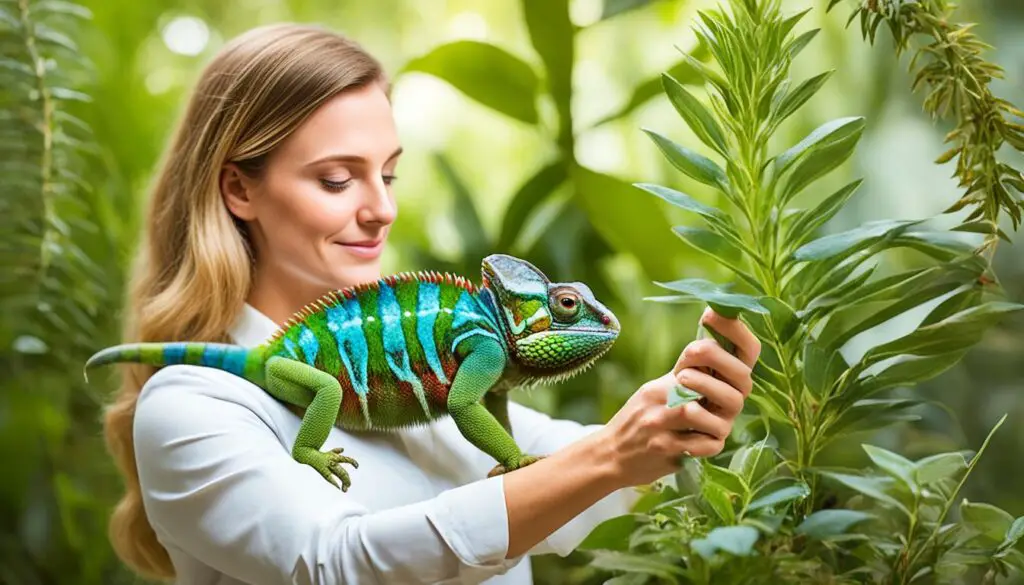
Exotic Pet Housing and Environment
Caring for exotic pets means more than just food and handling. Creating a good home is vital for their health. Let’s look into how to make a safe and comfy space for your special pet.
Location and Safety
The perfect spot for your pet’s house must be quiet and away from drafts. This keeps your pet happy. Also, keep their home away from big pets to avoid trouble or fear.
Climate Control
It’s essential to have the right temperature, humidity, and light for exotic pets. Set up heating and cooling systems for them. Make sure the air is not too dry or damp to avoid health problems. Also, use special lights that offer UVB and UVA rays, necessary for many pets’ health.
Bedding and Hygiene
Choosing good bedding is key for your pet’s comfort. Look up the best bedding type, considering how well it absorbs, controls dust, and is safe. Clean the bedding often to keep the place smelling fresh and your pet healthy.
Resource Access
Having easy resources is important for a happy home. Your pet should be able to easily find food, water, hiding spots, and fun things to play with. This helps them feel safe and act naturally.
Exotic Pet Nutrition and Diet
Exotic pets need the right food to stay healthy. They have unique dietary needs that are key to their health and life span. It’s vital to give them food that suits their species.
They should eat what they would find in the wild. That means a mix of proteins, fats, carbs, vitamins, and minerals. This varied diet supports their health and growth.
Some store-bought foods might not be good for them. It’s smart to talk to a vet who knows about exotic pets. They can guide you on the best food for your pet’s specific needs.
A good diet is more than just one type of food. Your pet needs a mix, like fresh veggies, fruit, and proteins. This variety helps them stay healthy and get all their needed nutrients.
Key Considerations for Exotic Pet Nutrition
- Research the specific dietary requirements of your exotic pet species.
- Consult with an exotic pet veterinarian for dietary guidance.
- Avoid overfeeding and provide portion-controlled meals.
- Monitor your pet’s weight and adjust their diet accordingly.
- Introduce new foods gradually to prevent digestive upset.
- Limit treats and ensure they are nutritious and appropriate for your pet.
Poor nutrition can seriously harm exotic pets. A well-balanced, species-specific diet is vital for their health and happiness.
“A properly balanced diet is the key to a healthy and vibrant exotic pet.”
Exotic Pet Enrichment and Wellbeing
It’s crucial to keep exotic pets both physically and emotionally healthy. They have unique behaviors that should not be suppressed by living inside. Enrichment is key. It offers activities and environments that meet their special needs (exotic pet enrichment).
Toys and Visual Stimuli: Interactive toys are a big help for exotic pets. These toys should be similar to their wild prey or boost their mental skills. Mirrors or videos of nature can also give them something interesting to look at (toys, visual stimuli).
Structures and Resting Areas: They need places to act out their natural behaviors, like climbing and perching. These areas must be safe and right for their size. Giving them spots to rest and hide can lower their stress (structures).
Social Interactions and Companionship: Some exotic pets enjoy being around humans or other pets. But, it’s vital to choose friends for them wisely and introduce them slowly. Good friendships can make them less anxious and happier (social interactions, companionship).
Tip: Always check what your pet needs to stay happy and healthy. This includes the right type of play and who they get along with best.
Alleviating Captivity Stress: Living indoors might stress exotic pets out. Setting up places to climb, explore, and find food can make them feel better. Time and effort in keeping them mentally and physically active ensure they enjoy their lives more (wellbeing, captivity stress, natural behaviors).
By focusing on what exotic pets need, we can really help. Being aware of what they like and monitoring how they react can make a big difference. This care and attention can make their lives in captivity good and fulfilling.
Exotic Pet Veterinary Care Requirements
Exotic pets need proper veterinary care to stay healthy and happy. They should see a vet regularly for check-ups. This helps catch any health problems early. It gives them the best chance of living a long, healthy life with you.
Annual Physical Examination
Your exotic pet should have a yearly check-up. A vet who knows about exotic animals will look them over. They check for anything odd or signs they might be sick. They’ll look at their body, vital signs, eyes, ears, teeth, and skin.
Blood Work and Parasite Screenings
On top of the check-up, blood tests and looking for parasites are very important. Blood tests tell the vet how your pet’s organs are doing and their blood and hormone levels. Checking for parasites keeps your pet safe from internal bugs that can make them sick.
Daily Monitoring for Signs of Illness
You should check your pet every day for any changes. Watch for changes in how much they eat, their energy levels, how they look, and how they go to the bathroom. If you see they don’t eat much, lose weight, have odd poop, hard time breathing, or act strangely, get them to the vet right away.
Regular vet visits and keeping an eye out daily help catch problems early. This means your exotic pet has a better chance at a happy, healthy life.
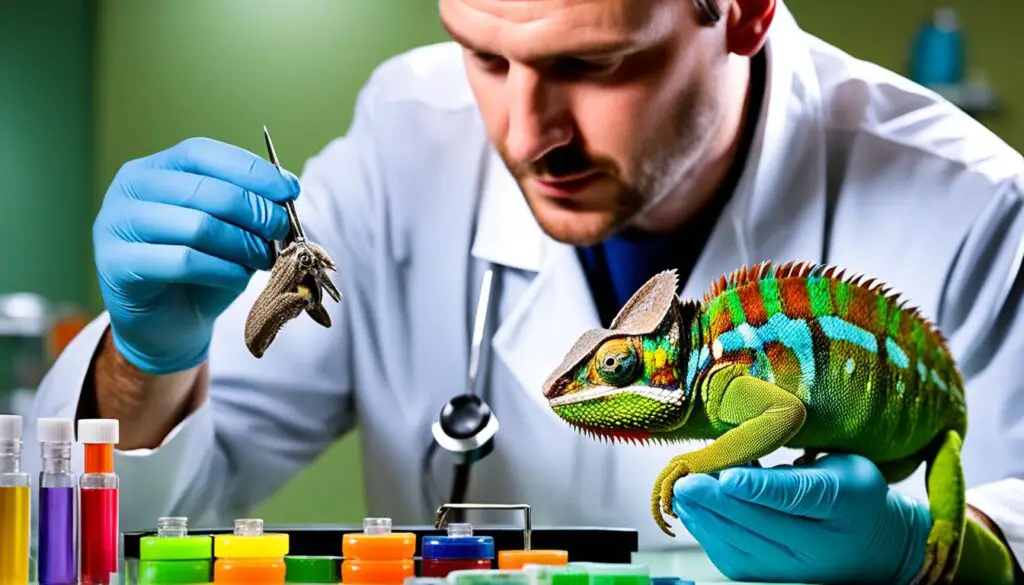
Examples of Exotic Pets
Exotic pets include many interesting animals. They range from small mammals to reptiles, and amphibians to birds. Each type offers something special and needs care to be happy in homes.
Small Mammals
Small mammals are great for those wanting a friend. This group includes bunnies and small rodents like guinea pigs and chinchillas. They bring joy with their cute actions.
Reptiles
Reptiles can be an adventure at home. This group has turtles, snakes, and lizards. They need a special place that feels like their natural one, with the correct temperature and humidity.
Amphibians
Amphibians offer something unique, like frogs and salamanders. They need a warm, moist spot. A set-up with water and hiding places will make them happy.
Birds
Birds are known for their beautiful looks and songs. From parakeets to parrots, they can be great companions. Birds require a roomy cage, good food, and lots of things to keep them mentally active.
Every exotic pet has its own specific care demands. It’s vital to research and get advice to meet those needs. This ensures the best life for the animal and its owner.
Exotic Pet Care Basics
Looking after exotic pets needs careful attention to detail. First, you must set up the right habitat. This enclosure must be suited to their needs and keep them safe.
Keeping your exotic pet safe is very important. The enclosure should stop them from getting out and prevent dangers. Check often for sharp bits, loose parts, and anything that might hurt them.
It’s critical to control the temperature and humidity. Exotic pets are used to different weather, so you need to learn about their needs. The right temperature and humidity levels keep them healthy and happy.
Light is also key for an exotic pet. For some, the right kind of light is a must. Make sure their home gets the right type of lighting to mimic where they come from. This includes UVB and UVA light if needed.
Exotic pets need things to do to be happy. Toys, climbing spots, and places to rest are great. These enrichment activities keep them from getting bored and sharpens their mind.
Nutrition is as important for them as it is for us. Find out what your pet should eat based on their species-specific diet. Make sure to avoid foods that can harm them.
In short, creating a good home for your exotic pet means a safe enclosure, the right temperature and humidity, proper lighting, things for them to do, and the right food. Focusing on these areas will make your pet’s life better and longer.
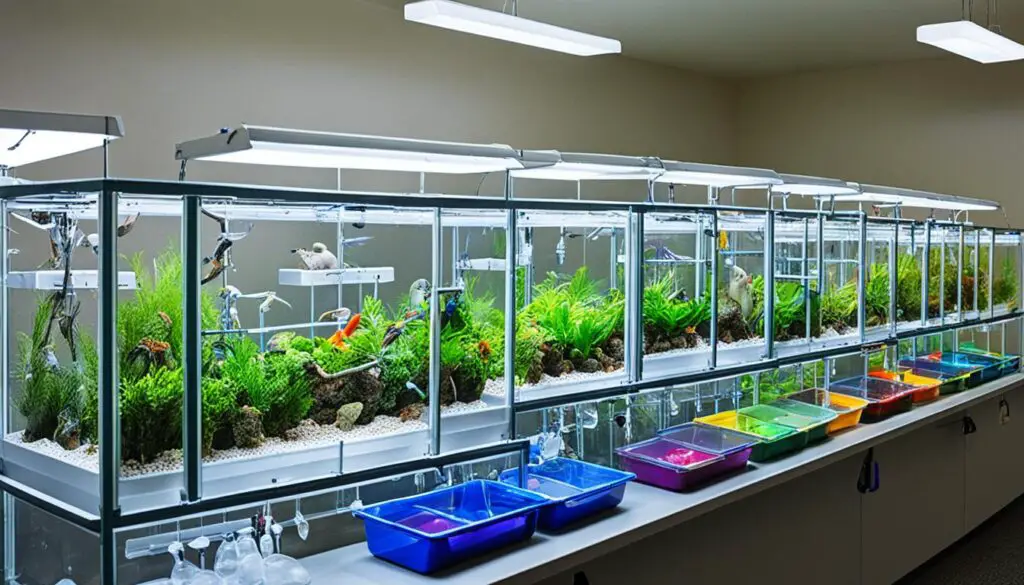
Health Care for Exotic Pets
Taking proper care of your exotic pet is crucial. They, like all animals, can get sick. It’s vital to watch them for any signs of health problems. This can be hard because exotic pets often hide when they feel unwell.
Preventive care is extremely important for their health and happiness. Regular check-ups help spot health issues early. A vet can look over your pet and answer any questions you have.
At a check-up, the vet will examine your pet’s health, including its weight and body condition. They might perform blood tests and screenings to find hidden health issues.
Preventive care also means giving them the right food, space to play, and things to keep them entertained. Watch how they act and if they stay healthy. Changes in behavior can signal health issues.
Choose a vet who knows about exotic animals. These vets are skilled in treating the unique health needs of exotic pets. They can deal with different illnesses and offer the right treatment.
Investing in your pet’s health means they can enjoy a long, happy life. Regular checks and expert care are vital for their well-being. Your exotic pet will thank you for it.
Signs of Illness in Exotic Pets
Spotting illness in exotic pets can be hard because they hide their symptoms. Be alert for any changes in your pet like how they act or eat. Watch out for these common signs of sickness:
- Loss of appetite or sudden weight loss
- Unusual feces or changes in fecal color, consistency, or odor
- Changes in urination or defecation habits
- Labored breathing or coughing
- Discharge from the nose, eyes, or ears
- Lethargy or lack of energy
- Changes in activity level or behavior
- Abnormal growths or lumps
- Skin abnormalities, such as rashes or lesions
If you see any of these signs or feel your pet is off, contact your vet right away. Treating illness early is important for a good outcome.
Wellness Exams for Exotic Pets
Wellness exams are very important for exotic pets. Your vet will give your pet a careful look and talk about any worries you have. They may suggest extra tests to check your pet’s health inside. These tests can find problems that aren’t obvious.
Vets can also tell you how to stop health problems for your pet’s kind. Regular check-ups are key for keeping your pet healthy. Work with your vet to set up how often these checks should happen for your pet.
| Preventive Care for Exotic Pets | Recommended Frequency |
|---|---|
| Wellness Exams | Annually |
| Blood Work | As recommended by veterinarian |
| Parasite Screenings | As recommended by veterinarian |
| Vaccinations | Species-specific; as recommended by veterinarian |
| Dental Exams/Cleanings | As recommended by veterinarian |
Considerations Before Getting an Exotic Pet
Having an exotic pet is thrilling and fulfilling. But, it requires specific steps for their care. You must think about several things. This ensures your pet is happy and you can meet their unique needs.
Controlled Environment
Exotic pets need a special place to live. You have to set the right temperature, humidity, and light. This space should feel like their natural home. It helps keep them healthy and happy.
Long-Term Commitment
Choosing an exotic pet is a big decision. They can live a long time, so be ready for that. It means years of love, care, and attention.
Specialist Food
Exotic pets eat unlike regular pets. You must look into what they need to eat. They might need special food or extra nutrients for good health.
Adequate Space
Exotic pets need more room than you think. They like to move around, explore, and act naturally. Make sure you have enough space for them to be comfortable.
Behavior Considerations
Each type of exotic pet acts differently and has unique needs. Learn about the pet’s behavior and what they need to be happy. This helps you decide if they fit your life and if you can keep them well.
Specialist Vet
Exotic pets need a vet who knows about them. It’s important to find a vet who is experienced with your pet’s species. Regular check-ups keep your exotic pet healthy.
Legal Requirements
It’s crucial to know the laws about exotic pets in your area. Different places have different rules for owning them. Follow these rules to avoid any trouble.
Thinking about these points can help you decide if you should get an exotic pet. Such pets need a lot of care and attention. But, they bring a unique beauty into your life.

| Considerations | Details |
|---|---|
| Controlled Environment | A suitable habitat with proper temperature, humidity, and lighting. |
| Long-Term Commitment | Exotic pets often have long lifespans, requiring years of care. |
| Specialist Food | Some exotic pets require specialized diets or supplements. |
| Adequate Space | Exotic pets need room to move and engage in natural behaviors. |
| Behavior Considerations | Research and understand the specific behaviors and social needs of the exotic pet species. |
| Specialist Vet | Access to a veterinarian experienced in exotic animal medicine. |
| Legal Requirements | Be aware of any legal restrictions or regulations regarding exotic pet ownership. |
Conclusion
Caring for an exotic pet means you should know what they need. Work with a vet that knows about exotic pets. This way, you can make sure your pet stays healthy and happy.
Exotic pet care covers many areas. You need to know how to handle and feed them. Make sure their living space is right. They also need to see a vet regularly. All these parts are key to keeping your unusual pet well.
For a vet, it’s very important to find someone who understands exotic animals. These vets are experts. They can deal with any health issues your pet might have.
Taking care of an exotic pet is a big deal. But, it’s also a special opportunity. With the right care and support, you and your pet can enjoy a long, loving relationship.
FAQ
What is an exotic pet?
How should exotic pets be handled and restrained?
What does proper housing and environment for exotic pets entail?
What are the nutritional needs of exotic pets?
How can I provide enrichment for my exotic pet?
How often do exotic pets need veterinary care?
What are some examples of exotic pets?
What are the basics of exotic pet care?
How important is health care for exotic pets?
What considerations should I make before getting an exotic pet?
Source Links
- https://www.happyhealthypets.com/pet-resources/comprehensive-guide-to-caring-for-exotic-pets
- https://villagevets.com/how-to-care-for-an-exotic-pet/
- https://www.rspca.org.uk/adviceandwelfare/pets/other
Peter Stones is the founder of Exotic Pets Place, the leading online resource for exotic pet care information.
With over 10 years of hands-on exotic pet ownership experience, he is deeply passionate about sharing his expertise to help others properly care for their unusual pets.
When he's not writing extensively researched articles or connecting with fellow exotic pet enthusiasts worldwide, you can find Peter at home tending to his own beloved menagerie of exotic animals.

